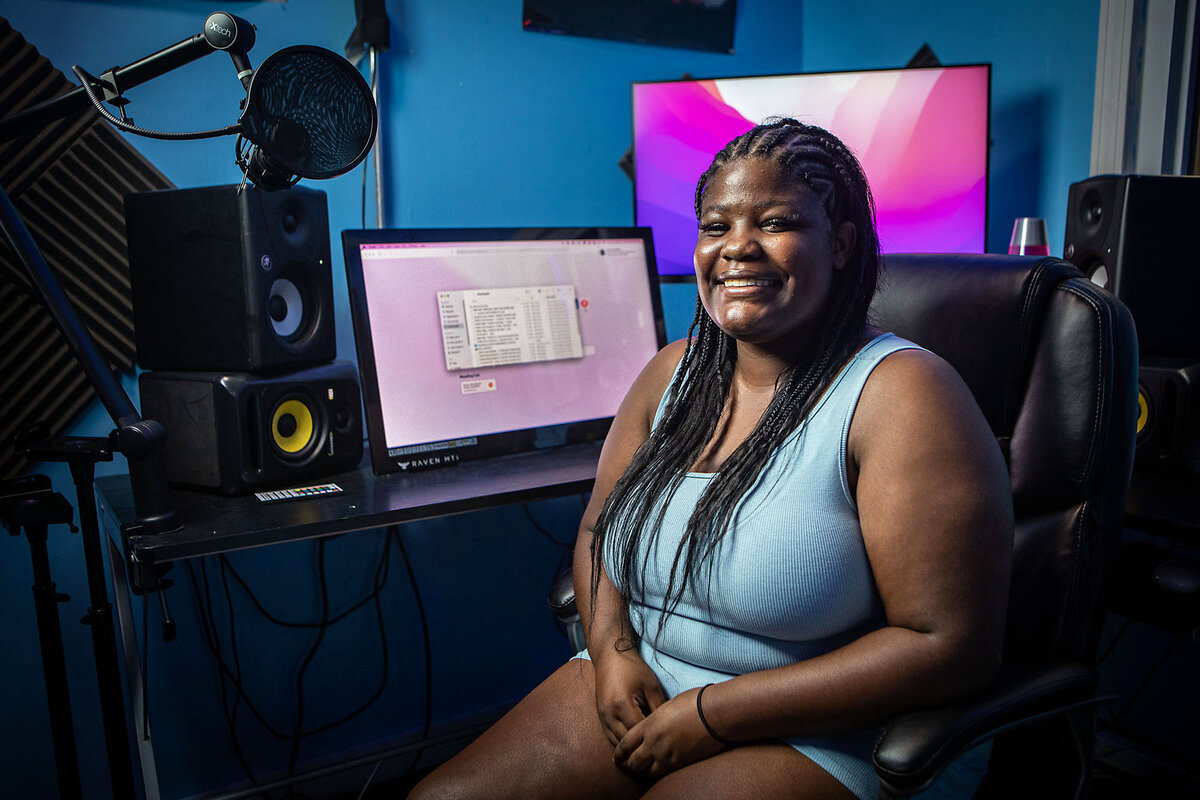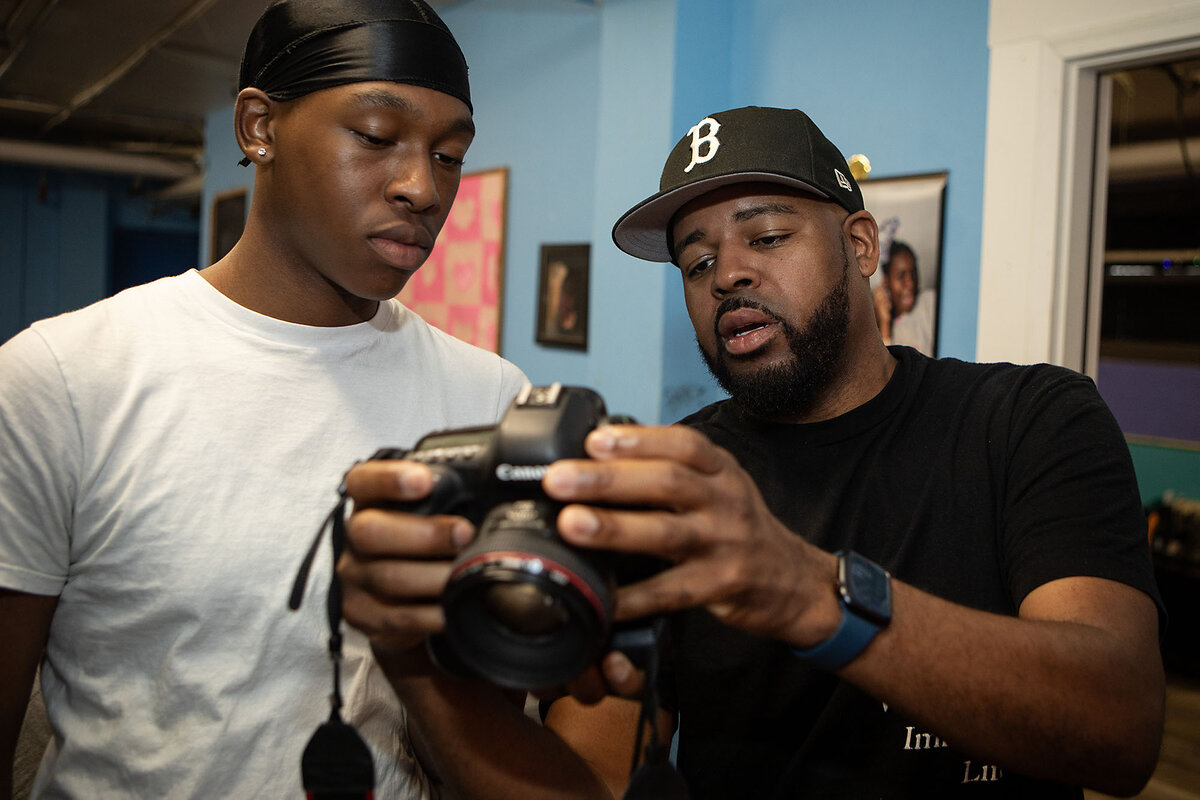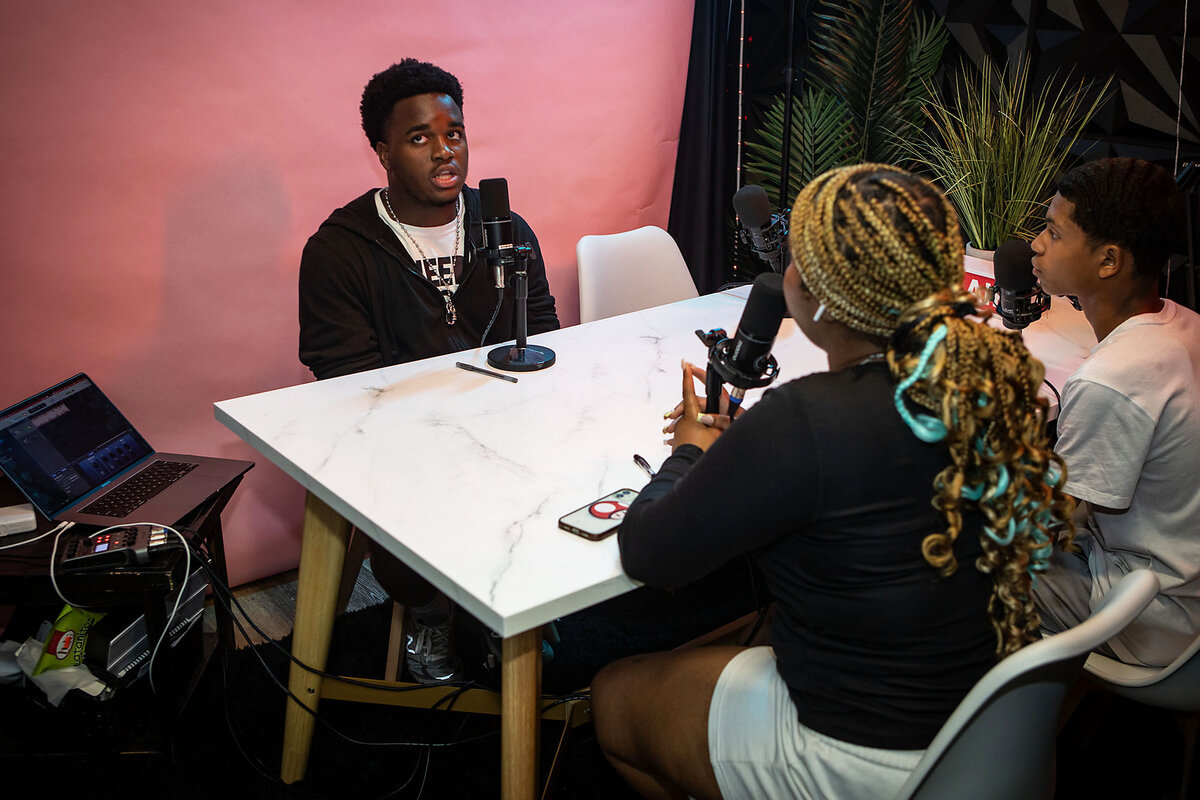Teen summer jobs are back. What’s behind the return of a rite of passage?
Loading...
| Boston
Getting a summer job used to mean scooping ice cream at the mall or working the drive-thru at Burger King. Then came the Great Recession, followed by a rush for teens to spend their summers padding their college résumés with coding and language camps.
That changed again when the world closed for COVID-19, and then reopened. Not all adults returned to their jobs. The virtual ones came and went. Enter the teenage worker, who is back in a way not seen since “Twilight’s” Team Edward or Team Jacob was the only divisive topic.
The year before the pandemic, teens accounted for just over 2% of new hires, according to Gusto, a human resources and payroll company. In 2023, teens accounted for 20% of new hires. This summer, the share of teens working or looking for work hit a 14-year high – 38%, reversing a decades-long decline, according to the Bureau of Labor Statistics.
Why We Wrote This
Sacking groceries and scooping ice cream had been seen as a vanished rite of passage. But this year, the teen summer job is back in a big way.
“Employers suddenly rediscovered teenagers as an important source of labor in the post-COVID economy, when adults realized they didn’t want to come back,” says Alicia Sasser Modestino, associate professor at Northeastern University, who has been surveying Boston’s summer employment program for nearly a decade.
The return of teens to lifeguard stations, grocery checkout lines, and summer camps has benefits beyond the paycheck, according to experts and the teens themselves. In addition to learning CPR or how to run a social media campaign, teens interviewed talk about learning financial literacy, planning for their future, and feeling part of a community.
Helping out the family
Consider Jayden Orr, 16, who just started in July at ABCD SummerWorks in Boston. His reason for getting a job is both pragmatic and profound.
“The main thing that’s on my mind lately is my family,” says Jayden, “because I got to help my family out. That’s how the family’s gonna eat.”
Zariyah Witherspoon, 17, also helps out her family, giving her mother $100 from her paychecks, the bulk of which she’s saving for college.
“I literally just save up my money because I’m leaving for college soon” says Zariyah. “And when I need to, I help my family. I give my mom $100 because, you know, why not? That’s my mom. I have to help around the house.”
Zariyah talks about growing up at the South Street Youth Center and finding her passion in the center’s boiler-room-turned-recording studio. As a 10-year-old, she helped replace the youth center’s floors and paint the walls a cheerful blue. She says the program and the mentorship she has received from her manager have helped her focus on her future.
“The studio did help me get in check and understand like, hey, if I want to do this for real, I have to fix my attitude and fix my act,” she says.
Jayden has been surprised at the immediate sense of community and the support he has gotten from the other teens. Already, he says, his co-workers feel like family.
The need to help at home is a primary motivation for teens seeking work, says Dr. Modestino.
“Nearly 70% of the young people in the summer jobs program are using some of their earnings to pay some kind of household bill. They’re helping pay rent, groceries, or utilities,” she says. “They’re paying for their own cellphone or their own clothes now.”
Allison Vernerey has been handling hundreds of applications a day. As executive director of the city’s Office of Youth Employment and Opportunity, she has also been meeting with families to place their youths in the right job.
The pandemic was especially tough for teens, says Ms. Vernerey. “I speak to a lot of the parents. ... There’s really this eagerness to in some way catch up and make sure that the youth are set up for success in the future. So we see that and we’re definitely seeing it in application trends, which are very, very high.”
Boston has promised that 100% of high schoolers who apply to the city’s summer employment program will be guaranteed a job. This year, the Office of Youth Employment and Opportunity reported a 15% increase in applicants, nearly 10,000 submissions. That’s slightly above pre-pandemic levels.
The benefits of a summer job can shape teens’ academic and social success in both the short and long term, according to a 10-year study conducted by Northeastern University on Boston’s teen summer employment programs.
In the short term, young people increase their aspirations to go to college, have higher GPAs, and less absenteeism in school, says Dr. Modestino. “Young people within the program are much more likely to say – on the order of ... upwards of 7 to 10 percentage points – more likely to say by the end of the summer that they want to go to a four-year college. A lot of that stems from the adult mentors that they get from working on the job, whether in the public or private sector.”
In the long term, the social-emotional skills developed on the job also reduce anxiety and conflict by training youths to deal with stressful situations. “We found that those soft skills – like managing emotions, resolving conflicts with a peer, and asking adults for help – those things are highly correlated with a reduction in criminal justice involvement. Young people in the program are 35% less likely to be involved in a violent crime and 29% less likely to be involved in a property crime,” says Dr. Modestino.
Learning financial literacy
The summer job is a rite of passage, and also most teens’ first introduction to earning money and how to manage it.
Thamel Thomas, 16, is a returning employee at the South Street Youth Center, where he’s learning how to use marketing strategies and multimedia production tools. After starting last summer, he stayed on through the school year. Now he’s a team manager, passing on skills to other teens.
“I got a summer job because ... I wanted to make money, but I also wanted to add experiences to my résumé. And especially with this job, you’re ... learning a whole bunch of skills,” says Thamel, who also works for SummerWorks, a citywide youth employment program.
He is thinking ahead to his future career – and also to the not-so-distant future. He pulls out the notes app on his iPhone and scrolls through a detailed list of budget items, with descriptions and dollar amounts.
“Basically, clothes ... savings, a bunch of things I need for the school year,” he explains. “Then, of course, I took into account food or entertainment or stuff like that.”
Other teen workers interviewed said their main focus was saving money, with goals ranging from 50% to 75% of their wages.
“Inflation is not only hitting employers’ labor costs. It’s also hitting teens’ pockets, as well as those of their families,” said Andrew Challenger, labor and workplace expert and senior vice president of Challenger, Gray & Christmas Inc.
The teens interviewed push back on the narrative – which has also been passed down through generations – that teenagers are lazy and don’t care about the future.
“Some employers are not sure if hiring youth is actually going to bring them value in terms of the work they do. However, what we see is actually completely the opposite. ... They are so powerful in terms of the mindset they bring to work and their ability to approach problems and think differently,” says Ms. Vernerey.
Planning for the future
Gwen Duda has already been working for years. She has been saving her wages since she was a babysitting tween, then a boutique employee. This summer, she’s working the front desk at the Parkway Community YMCA. As she readies for her first semester of college, she’s worried about inflation and the cost of tuition.
“I’m trying to put a lot of money away for college tuition. I’m going to UMass Amherst, which is exciting, and I’m trying to figure out how to save for that. And, yeah, I mean, it’s just like a lot to think about. College is so much more money now,” she says. “I think that like financial needs and what you have to prepare for financially is so much more on your mind when you’re younger now.”
“What I see is that more kids are getting jobs because parents aren’t always going to be able to buy the stuff they want, so teens want to be more independent,” says Jason Tackie, another camp counselor at the YMCA in West Roxbury.
Jason started working after his first year of high school to buy new shoes and basketball equipment. He didn’t expect to be learning new skills, gaining new mentors, or frankly, learning to have fun while working.
He says having a job has improved his time management in school, too. Jason wants to study nursing at a four-year college, something he said he has only realized recently.
“My favorite part also is, like, getting to learn new skills,” says Jason. “My supervisor for sports, Manny, actually taught me, like, a lot of new skills that will help me in the future. He’s made me a better leader for sure when it comes to being around kids. ... So, yeah, he’s played a big role in my life.”
“There’s a lot of stuff that I learned on the job that I didn’t know that I was going to learn,” he adds. “I feel like it motivates me every day to come here and make sure everyone’s having a good time. It’s helped me grow up a lot.”









